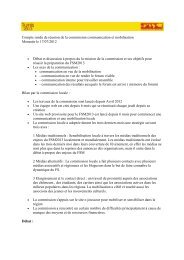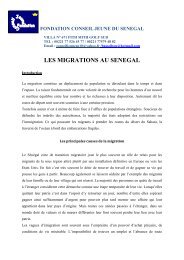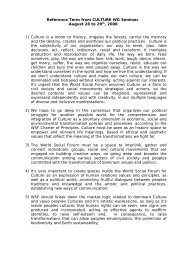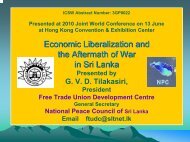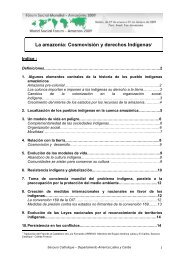Create successful ePaper yourself
Turn your PDF publications into a flip-book with our unique Google optimized e-Paper software.
vindicated by the global financial crisis?<br />
<strong>Press</strong> <strong>Report</strong> <strong>Europe</strong> <strong>WSF</strong> <strong>2009</strong><br />
Aye Aye Win: The financial crisis is a sad proof that globalisation based only on the values of the market is<br />
fundamentally flawed. You cannot endlessly go on speculating in the global casino. The bubble cannot endlessly<br />
grow. All of them eventually burst, leaving millions destitute, as is the case now. The reckless behaviour of the<br />
financiers, and the system that permits it, amount to a crime of unimaginable scale. What angers me in all this is<br />
that governments come galloping along to rescue the very financial institutions that have profiteered from the<br />
people and whose behaviour has led to the crisis! Having said this, it is also obvious that state intervention is<br />
necessary now that chaos has come.<br />
IPS: Do you think this will lead to a different type of capitalism?<br />
AAW: After a bit of patchwork here and there through bailout plans and stimulus packages, there is a real risk<br />
that things will soon return to business as usual - capitalists return to market worship, start playing again in the<br />
global casino and again enter another cycle of speculation. We as social activists have an opportunity now to go<br />
back to the drawing board to reconstruct the global economic system to be one based not on greed but one<br />
that does reward hard work and innovation, a system built on solidarity and justice. We need to come up with<br />
viable alternatives - move beyond ideology and find solutions that work. This will indeed be a challenge. We are<br />
so good at 'opposing' but we need to become much better at 'proposing'!<br />
IPS: The <strong>WSF</strong> meets in January, when its 'rival', the WEF convenes in Davos. How far do you think the<br />
<strong>WSF</strong> has imposed issues on the WEF agenda?<br />
AAW: Whilst the <strong>WSF</strong> is really the Mecca for the social activist, very little about the <strong>WSF</strong> is known outside this<br />
circle. On the other hand, the WEF, that enjoys not only access to but also control of the global media, is much<br />
better known to the broader public. Whilst recognising the efforts made by charismatic civil society leaders from<br />
the <strong>WSF</strong> to influence our issues at the WEF, I feel that the impact so far has been marginal. Therefore we need<br />
to sharpen our ideas and develop viable proposals. If our leaders need good ideas, let them come to us at the<br />
<strong>WSF</strong>, and not go dancing to the corporate tune at the WEF circus in Davos.<br />
IPS: The eighth <strong>WSF</strong> last year was truly global, with the Global Call for Action (GCAP) inviting<br />
organisations from all around the globe to mobilise on Jan. 26. How do you see this wandering meeting<br />
evolving?<br />
AAW: To get good coverage and make impact you need a combination of interventions acting in concert. So<br />
this global mobilisation was great to have; different groups ranging from the most well-known international<br />
NGOs all the way to community based organisations doing something on that same day. There are clear<br />
opportunities to go beyond your usual conference circuit goers and reach out to the people to organise<br />
something at national or local levels and yet have the feeling that you are part of a global initiative. Obviously it<br />
cannot work on its own. This needs to be combined with a clear central message that captures the spirit of the<br />
<strong>WSF</strong>.<br />
IPS: Inside the <strong>WSF</strong>, there are different groups, some advocating a more centralised, coherent<br />
approach. Others have criticised it for its attempts to become a central decision-making venue for<br />
dissident groups. What is your position?<br />
AAW: The <strong>WSF</strong> is many things to many people including what you have just described. I personally don't get<br />
involved in either the romanticising of the <strong>WSF</strong> or the politicking within it. I look to the <strong>WSF</strong> for what it is - a<br />
great global space for exchange and solidarity. I also look to the future - when <strong>WSF</strong> can be practical and<br />
effective, be a global leader and opinion shaper - to communicate our messages clearly, and to develop our<br />
proposals and to bring about change.<br />
IPS: Dignity International strives to build new generation human rights NGOs aiming at lasting social<br />
transformation. What is your role at the <strong>WSF</strong>?<br />
AAW: Dignity's role at this forum is to support our social movement partners from Africa, Asia, the Americas, to<br />
11




